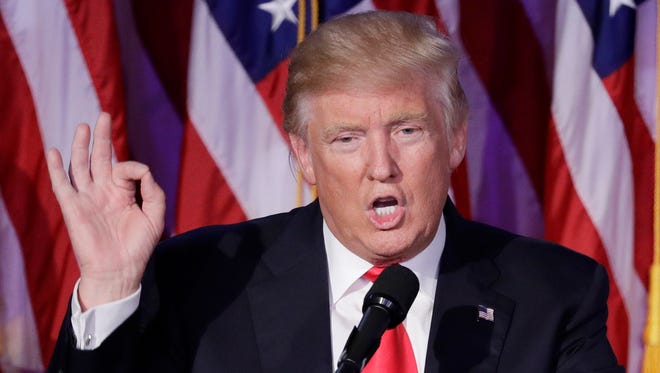Trump budget plan would squeeze states over environmental programs

WASHINGTON – President Trump’s budget is a double-whammy for states: Not only would it cut grants to their environmental programs by nearly $500 million next year, states still would have to meet federal monitoring and compliance targets or face severe sanctions from Washington including the potential loss of highway aid.
The environmental cuts are outlined in budget documents for the Environmental Protection Agency obtained by the National Association of Clean Air Agencies, the trade group that represents state agencies regulating air quality.
The documents show that while funding in 2018 for the EPA as a whole would drop from $8.2 billion to $5.7 billion, or 31% under Trump's plan, state and tribal assistance grants would be slashed from $1.08 billion to $597 million, or 45%.
Those grants pay for states to carry out a number of federal directives such as toxic substance compliance, pesticides enforcement and brownfield inspections. Some of those categories have been zeroed out entirely, including beach protection, radon monitoring and lead testing, the documents show.
NACAA Executive Director Bill Becker calls the budget “terribly disingenuous” considering states are still expected to carry out many of those tasks on behalf of the federal government. Not only will more people get sick or die prematurely if environmental rules aren’t enforced, but states will face a menu of penalties by not carrying them out, he said.
Not meeting clean air rules, for example, could result in a state losing millions in federal highway funds or facing limits on new construction that don’t meet pollution offset rules, he said.
“This becomes a self-fulfilling prophecy,” Becker said. “They know today that if they cut their own budget and cut the states’ budget, we’re going to face some very serious health, welfare and even economic consequences for all this.”
Read more:
President Trump's EPA is facing fire amid efforts to rein in agency
President Trump's budget would cut Superfund toxic cleanup program by 30%
Donald Trump's budget would eliminate key program testing Everglades water
The reductions in state grants are part of a nearly $2.6 billion cut – 31% — to the EPA that reflect Trump’s promise of rolling back environmental regulations to spur job growth and free up resources to help pay for a new southern border wall and military buildup.
Congress earlier this month approved $8.24 billion for the EPA in 2017 as part of a deal to keep the government open through the rest of the fiscal year, which ends Sept. 30. Trump’s budget for the 2018 fiscal year that begins Oct. 1 would provide $5.66 billion, a funding level the White House first announced in March without providing great detail.
The administration’s is set to release those budget details Tuesday for EPA and dozens of other federal agencies.
EPA Administrator Scott Pruitt in an interview on Fox News last month said he believes states "have the resources and the expertise to deal with clean water and clean air issues" even with the EPA cuts.The former Oklahoma attorney general, who has met with more than 20 governors, said he thinks states are committed to make sure their residents are protected.
"They have to serve their people in those states as well and this attitude in Washington, D.C., that people in Texas and Oklahoma and Kansas and Colorado and the rest of the country don't care about the water they drink or the air they breathe and are not going to take care of the air and the water locally and stateside, I just don't believe that. That narrative is something we reject and we look forward to partnering with states to achieve good outcomes."
The documents obtained by NACAA show that some of the agency’s signature programs would be significantly scaled back, including science and technology programs (39% cut) and Superfund toxic waste cleanup (30% cut).
The Trump administration would also eliminate at least 10 EPA regional programs, including the Great Lakes, Puget Sound and the Chesapeake Bay, created to help restore fragile ecologies in vulnerable areas.
One of those, the South Florida Geographic Initiative, tracks the health of the Everglades and has been monitoring the threat of phosphorous, mercury and other damaging nutrients seeping into the Everglades. The data it collected for the EPA and Florida agencies was key to a nearly billion-dollar court-ordered settlement in 2012 to protect the River of Grass from encroaching pollution.
Eliminating the initiative “would cripple the federal government’s role in maintaining water quality for the Everglades and basically blind us to what’s going on out there,” Tom Van Lent, director of programs at the Everglades Foundation, said recently.

“These iconic waterways support the health and economies of communities all across this country,” said Alex Taurel, deputy legislative director for the League of Conservation Voters. “Protecting and restoring these waters has long been a bipartisan priority, and these cuts show how out of touch Trump and (EPA Administrator Scott) Pruitt are with people in these regions.”
Pruitt does not appear to have won many battles either. At a meeting in March, he touted his support for Superfund and the brownfields program, which funds cleanups of less toxic sites. But both take large hits in the budget, including brownfields, which would see a 37% cut in EPA funding to manage the program and a 30% drop in grants to states.
A number of lawmakers, including several Republicans, have raised alarms about the size of the EPA cuts. Some have vowed to push back on any cuts.
But Becker isn’t very confident hope that a Congress controlled by Republicans is going to stop all the cuts a Republican White House proposes.
“You throw slop against a wall and some of it is going to stick,” he said.
Read more:
6 things to watch in Trump's first full budget plan
Don't expect Congress to pass Trump's controversial budget plan